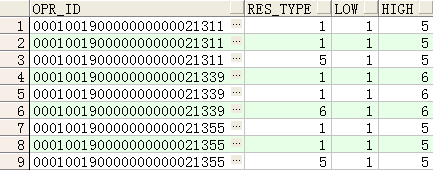转: OVER() 系列函数介绍
OVER(PARTITION BY)函数介绍
Oracle从8.1.6开始提供分析函数,分析函数用于计算基于组的某种聚合值,它和聚合函数的不同之处是:对于每个组返回多行,而聚合函数对于每个组只返回一行。
开窗函数指定了分析函数工作的数据窗口大小,这个数据窗口大小可能会随着行的变化而变化,举例如下:
1:over后的写法:
over(order by salary) 按照salary排序进行累计,order by是个默认的开窗函数
over(partition by deptno)按照部门分区
2:开窗的窗口范围:
over(order by salary range between 5 preceding and 5 following):窗口范围为当前行数据幅度减5加5后的范围内的。
举例:
--sum(s)over(order by s range between 2 preceding and 2 following) 表示加2或2的范围内的求和
select name,class,s, sum(s)over(order by s range between 2 preceding and 2 following) mm from t2
adf 3 45 45 --45加2减2即43到47,但是s在这个范围内只有45
asdf 3 55 55
cfe 2 74 74
3dd 3 78 158 --78在76到80范围内有78,80,求和得158
fda 1 80 158
gds 2 92 92
ffd 1 95 190
dss 1 95 190
ddd 3 99 198
gf 3 99 198
举例:
select name,class,s, sum(s)over(order by s rows between 2 preceding and 2 following) mm from t2
adf 3 45 174 (45+55+74=174)
asdf 3 55 252 (45+55+74+78=252)
cfe 2 74 332 (74+55+45+78+80=332)
3dd 3 78 379 (78+74+55+80+92=379)
fda 1 80 419
gds 2 92 440
ffd 1 95 461
dss 1 95 480
ddd 3 99 388
gf 3 99 293
3、与over函数结合的几个函数介绍
下面以班级成绩表t2来说明其应用
t2表信息如下:
cfe 2 74
dss 1 95
ffd 1 95
fda 1 80
gds 2 92
gf 3 99
ddd 3 99
adf 3 45
asdf 3 55
3dd 3 78
select * from
(
select name,class,s,rank()over(partition by class order by s desc) mm from t2
)
where mm=1;
得到的结果是:
dss 1 95 1
ffd 1 95 1
gds 2 92 1
gf 3 99 1
ddd 3 99 1
注意:
1.在求第一名成绩的时候,不能用row_number(),因为如果同班有两个并列第一,row_number()只返回一个结果;
select * from
(
select name,class,s,row_number()over(partition by class order by s desc) mm from t2
)
where mm=1;
1 95 1 --95有两名但是只显示一个
2 92 1
3 99 1 --99有两名但也只显示一个
2.rank()和dense_rank()可以将所有的都查找出来:
如上可以看到采用rank可以将并列第一名的都查找出来;
rank()和dense_rank()区别:
--rank()是跳跃排序,有两个第二名时接下来就是第四名;
select name,class,s,rank()over(partition by class order by s desc) mm from t2
dss 1 95 1
ffd 1 95 1
fda 1 80 3 --直接就跳到了第三
gds 2 92 1
cfe 2 74 2
gf 3 99 1
ddd 3 99 1
3dd 3 78 3
asdf 3 55 4
adf 3 45 5
--dense_rank()l是连续排序,有两个第二名时仍然跟着第三名
select name,class,s,dense_rank()over(partition by class order by s desc) mm from t2
dss 1 95 1
ffd 1 95 1
fda 1 80 2 --连续排序(仍为2)
gds 2 92 1
cfe 2 74 2
gf 3 99 1
ddd 3 99 1
3dd 3 78 2
asdf 3 55 3
adf 3 45 4
--sum()over()的使用
select name,class,s, sum(s)over(partition by class order by s desc) mm from t2 --根据班级进行分数求和
dss 1 95 190 --由于两个95都是第一名,所以累加时是两个第一名的相加
ffd 1 95 190
fda 1 80 270 --第一名加上第二名的
gds 2 92 92
cfe 2 74 166
gf 3 99 198
ddd 3 99 198
3dd 3 78 276
asdf 3 55 331
adf 3 45 376
first_value() over()和last_value() over()的使用

--找出这三条电路每条电路的第一条记录类型和最后一条记录类型
first_value(res_type) over(PARTITION BY opr_id ORDER BY res_type) low,
last_value(res_type) over(PARTITION BY opr_id ORDER BY res_type rows BETWEEN unbounded preceding AND unbounded following) high
FROM rm_circuit_route
WHERE opr_id IN ('000100190000000000021311','000100190000000000021355','000100190000000000021339')
ORDER BY opr_id;

注:rows BETWEEN unbounded preceding AND unbounded following 的使用
--取last_value时不使用rows BETWEEN unbounded preceding AND unbounded following的结果
first_value(res_type) over(PARTITION BY opr_id ORDER BY res_type) low,
last_value(res_type) over(PARTITION BY opr_id ORDER BY res_type) high
FROM rm_circuit_route
WHERE opr_id IN ('000100190000000000021311','000100190000000000021355','000100190000000000021339')
ORDER BY opr_id;
如下图可以看到,如果不使用

数据如下:

取出该电路的第一条记录,加上ignore nulls后,如果第一条是判断的那个字段是空的,则默认取下一条,结果如下所示:


lag(expresstion,<offset>,<default>)
with a as
(select 1 id,'a' name from dual
union
select 2 id,'b' name from dual
union
select 3 id,'c' name from dual
union
select 4 id,'d' name from dual
union
select 5 id,'e' name from dual
)
select id,name,lag(id,1,'')over(order by name) from a;
--lead() over()函数用法(取出后N行数据)
lead(expresstion,<offset>,<default>)
with a as
(select 1 id,'a' name from dual
union
select 2 id,'b' name from dual
union
select 3 id,'c' name from dual
union
select 4 id,'d' name from dual
union
select 5 id,'e' name from dual
)
select id,name,lead(id,1,'')over(order by name) from a;
--ratio_to_report(a)函数用法 Ratio_to_report() 括号中就是分子,over() 括号中就是分母
with a as (select 1 a from dual
union all
select 1 a from dual
union all
select 1 a from dual
union all
select 2 a from dual
union all
select 3 a from dual
union all
select 4 a from dual
union all
select 4 a from dual
union all
select 5 a from dual
)
select a, ratio_to_report(a)over(partition by a) b from a
order by a;
with a as (select 1 a from dual
union all
select 1 a from dual
union all
select 1 a from dual
union all
select 2 a from dual
union all
select 3 a from dual
union all
select 4 a from dual
union all
select 4 a from dual
union all
select 5 a from dual
)
select a, ratio_to_report(a)over() b from a --分母缺省就是整个占比
order by a;
with a as (select 1 a from dual
union all
select 1 a from dual
union all
select 1 a from dual
union all
select 2 a from dual
union all
select 3 a from dual
union all
select 4 a from dual
union all
select 4 a from dual
union all
select 5 a from dual
)
select a, ratio_to_report(a)over() b from a
group by a order by a;--分组后的占比
--转自:https://www.cnblogs.com/yyhxqx/p/4795296.html
转: OVER() 系列函数介绍的更多相关文章
- openssl之EVP系列之13---EVP_Open系列函数介绍
openssl之EVP系列之13---EVP_Open系列函数介绍 ---依据openssl doc/crypto/EVP_OpenInit.pod翻译和自己的理解写成 (作者:Dra ...
- openssl之EVP系列之12---EVP_Seal系列函数介绍
openssl之EVP系列之12---EVP_Seal系列函数介绍 ---依据openssl doc/crypto/EVP_SealInit.pod翻译和自己的理解写成 (作者:Dra ...
- openssl之EVP系列之11---EVP_Verify系列函数介绍
openssl之EVP系列之11---EVP_Verify系列函数介绍 ---依据openssl doc/crypto/EVP_VerifyInit.pod翻译和自己的理解写成 (作者 ...
- openssl之EVP系列之10---EVP_Sign系列函数介绍
openssl之EVP系列之10---EVP_Sign系列函数介绍 ---依据openssl doc/crypto/EVP_SignInit.pod翻译 (作者:DragonKing, ...
- Mem系列函数介绍及案例实现
昨天导师甩给我们一个项目案例,让我们自己去看一看熟悉一下项目内容,我看到了这个项目里面大量使用memset(sBuf,0,sizeof(sBuf));这一块内存填充的代码,于是回想起以前查过Mem ...
- Python开发【第三章】:Python函数介绍
一. 函数介绍 1.函数是什么? 在学习函数之前,一直遵循面向过程编程,即根据业务逻辑从上到下实现功能,其往往用一长段代码来实现指定功能,开发过程中最常见的操作就是粘贴复制,也就是将之前实现的代码块复 ...
- 从简单需求到OLAP的RANK系列函数
同事问了一个非常简单的问题,怎么取出每个partition里面另外一个列的最小值? create table t1 (int c1, int c2); 假如按照c2分区,0-10,10-20,20 ...
- linux tricks 之VA系列函数.
VA函数(variable argument function),参数个数可变函数,又称可变参数函数.C/C++编程中,系统提供给编程人员的va函数很少.*printf()/*scanf()系列函数, ...
- 原子操作 Interlocked系列函数
上一篇<多线程第一次亲密接触 CreateThread与_beginthreadex本质区别>中讲到一个多线程报数功能.为了描述方便和代码简洁起见,我们可以只输出最后的报数结果来观察程序是 ...
随机推荐
- 业务开发(一)—— MySQL
0x01.SQL异常Incorrect string value java.sql.SQLException: Incorrect string value: '\xE6\x88\x91\xE7\x9 ...
- Redis学习笔记(1)-安装Oracle VM VirtualBox
Oracle VM VirtualBox官网网址 打开安装包网址界面,如下所示,点击截图红框. 下载完成后,点击exe文件,不停的点击下一步. 因为是使用MarkDown编辑器书写的尝试,所以写的简单 ...
- Chrome插件开发,美化网页上的文件列表。chrome-extension,background
上一篇文章 通过“content-scripts”的方式向页面注入js和css来美化页面,但是有一个弊端:一旦配置好需要注入的页面,之后如果这个页面地址以后发生变化,或者要新加一些URL进来,那么得修 ...
- BurpSuiteProxy安装使用
第一步先安装jdk https://www.oracle.com/technetwork/java/javase/downloads/jdk11-downloads-5066655.html ...
- Partition(hdu4651)2013 Multi-University Training Contest 5
Partition Time Limit: 6000/3000 MS (Java/Others) Memory Limit: 32768/32768 K (Java/Others) Total Sub ...
- css 性能优化小结
1.能用css不用js 1.鼠标悬浮展示 2.自定义radio.checkbox的样式 3.巧用css伪类 当input获取焦点时候,把右边的按钮改变样式 检测用户输入:如果 ...
- C# 实现连连看功能
本文是利用C#实现连连看的小例子,以供学习分享使用.如有不足之处,还望指正. 思路: 初始化布局(横竖十行十列,共100个单元格,每一个格一个按钮,背景图为水果图片,随机生成) . 初始化对应棋盘(用 ...
- 山东理工大学SDUT - ACM OJ 题: Python代码 及分析
Python基础语法学习完成,先刷基础题100道巩固 ,附 题目.代码.知识分析 题目:http://acm.sdut.edu.cn/onlinejudge2/index.php/Home/Index ...
- (网页)jquery-qrcode.js生成二维码
基础用法 <div id="qrcode"></div> <script type="text/javascript"> n ...
- Django 登录验证-自动重定向到登录页
Web项目有些场景需要做用户登录验证,以便访问不同页面. 方法一:login_required装饰器 适用于函数视图. from django.contrib.auth.decorators impo ...
